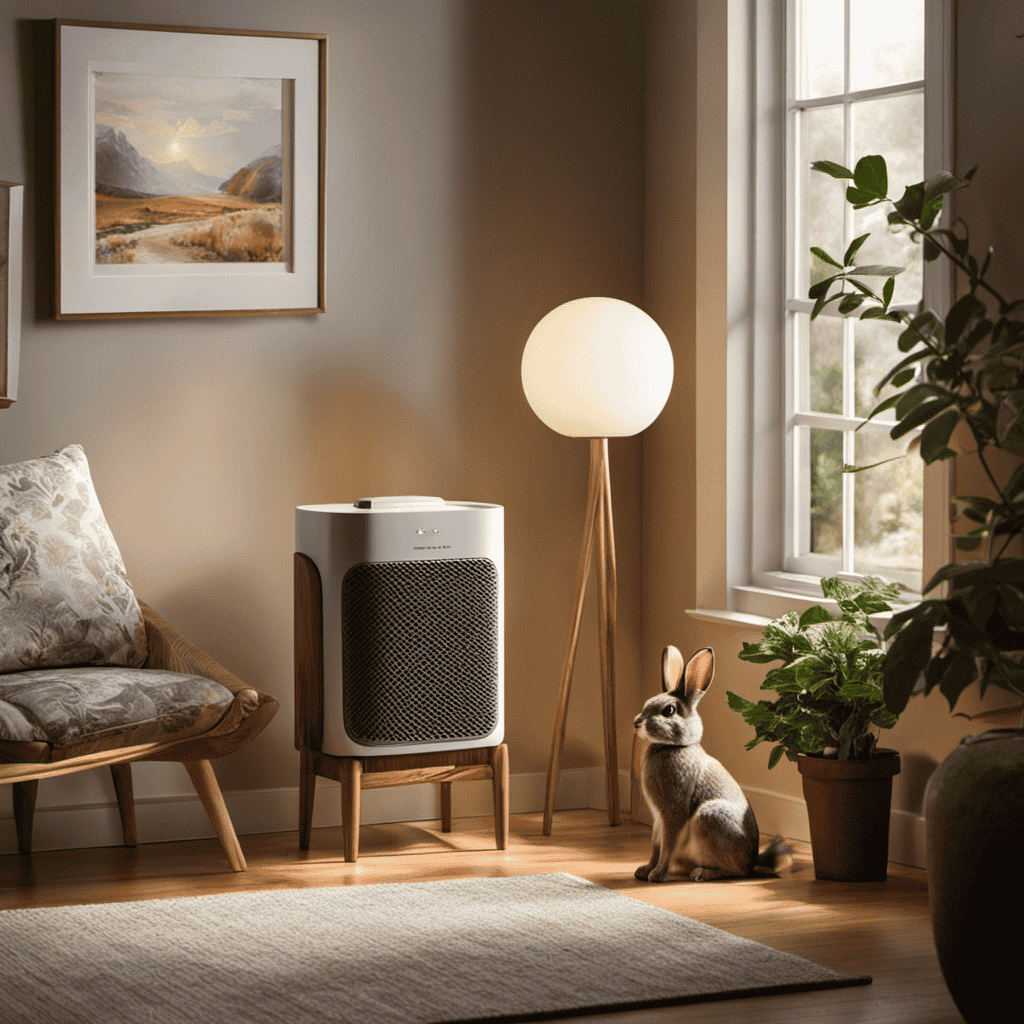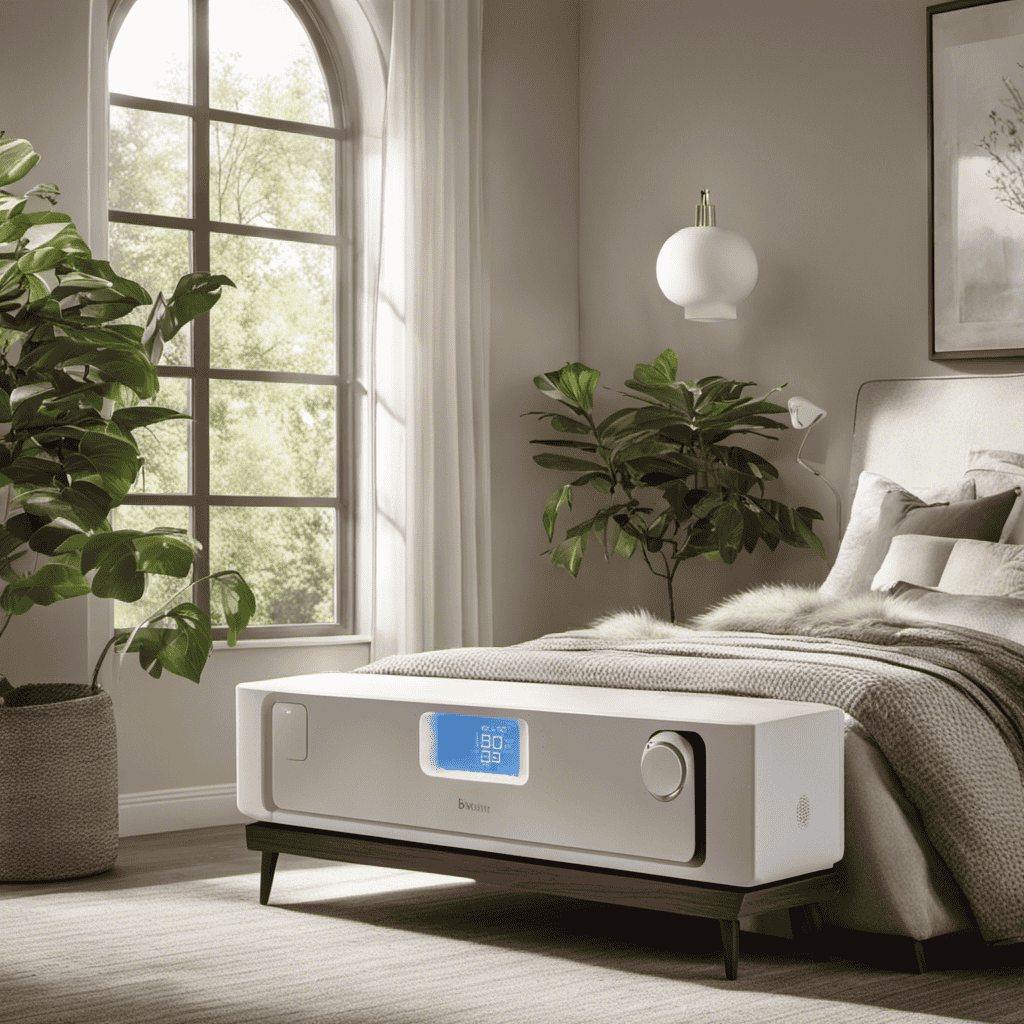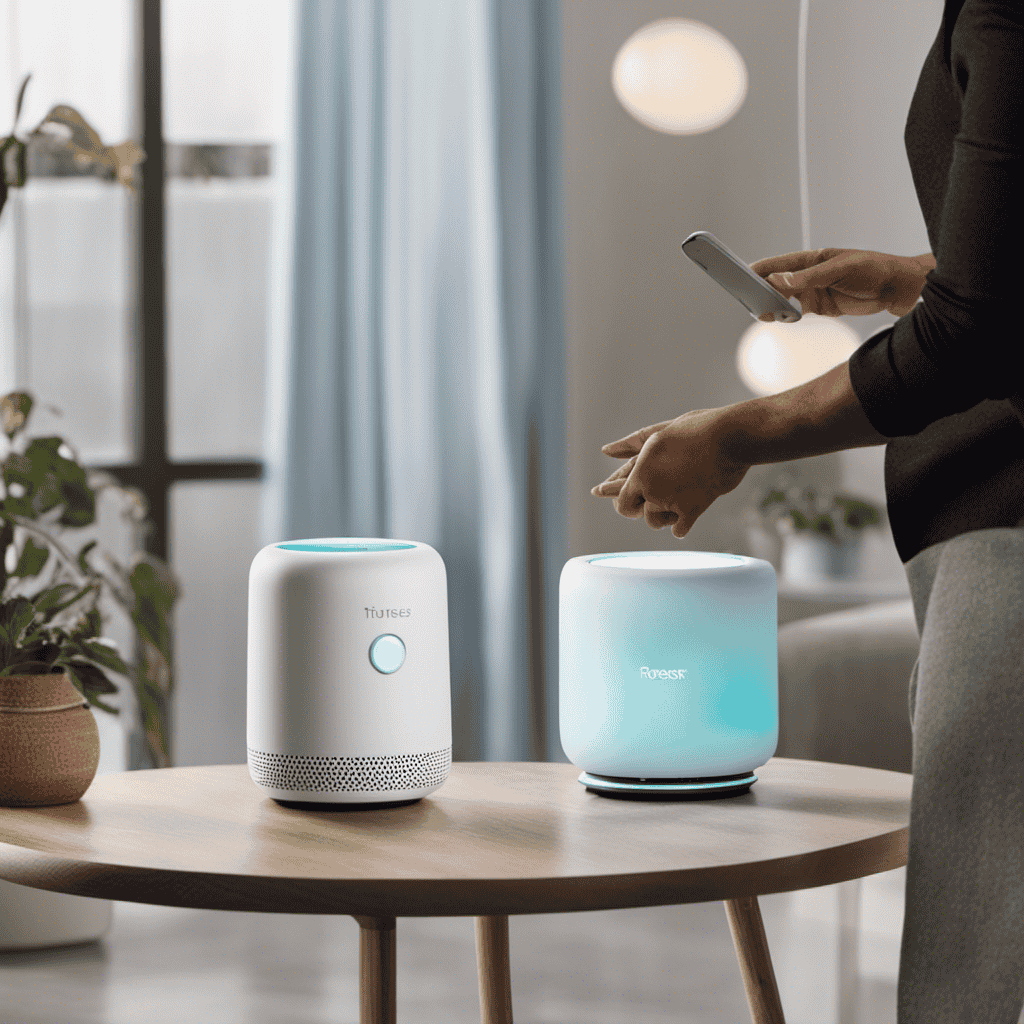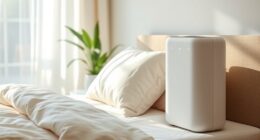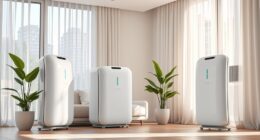I have often pondered how long I should keep my Dyson air purifier running to maintain the best air quality in my home. Were you aware that indoor air can be up to five times more polluted than outdoor air? This is why it is important to know the suggested running time for Dyson air purifiers and how to customize it for various room sizes.
In this article, we’ll dive into the factors to consider when determining air purifier run time and provide tips for maximizing its effectiveness.
Key Takeaways
- Indoor air can be up to five times more polluted than outdoor air.
- Factors such as outdoor pollution, indoor allergens, and volatile organic compounds (VOCs) can affect air quality.
- Adjusting the fan speed and monitoring air quality are important for air purifier efficiency.
- Proper placement, regular filter maintenance, and balancing energy consumption are crucial for effective air purification.
Optimal Duration for Dyson Air Purifier Usage
You should leave your Dyson air purifier on for at least 8 hours a day to ensure optimal air quality in your home.
Several factors affect air quality, including outdoor pollution, indoor allergens, and volatile organic compounds (VOCs) released from household products. These pollutants can lead to respiratory problems, allergies, and other health issues.
Air purification helps remove these harmful substances from the air, improving the overall air quality. When the Dyson air purifier is in operation, it captures and traps particles as small as 0.3 microns, including dust, pollen, and pet dander. It also eliminates odors and harmful gases, providing a fresh and clean environment.
Factors to Consider When Determining Air Purifier Run Time
When determining run time for an air purifier, there are several factors to consider.
One important factor is adjusting the fan speed. Higher fan speeds can clean the air faster but consume more energy, while lower fan speeds are more energy-efficient but take longer to purify the air.
Another factor to consider is monitoring air quality. If you live in a highly polluted area or have allergies, you may need to run the air purifier for longer periods to maintain clean air.
It’s also important to consider the size of the room and the level of pollution. By taking all these factors into account, you can set the right time frame for effective air purification.
This ensures that your air purifier runs for an optimal duration to keep the air in your home clean and healthy.
Setting the Right Time Frame for Effective Air Purification
When determining the optimal duration for air purification, several factors come into play.
Firstly, the size of the room and the air purifier’s Clean Air Delivery Rate (CADR) must be considered to ensure efficient cleaning.
Secondly, the level of pollutants and contaminants in the air will affect the effectiveness of the purification process.
Lastly, it’s important to strike a balance between achieving maximum purification and minimizing energy consumption to ensure cost-effectiveness and environmental sustainability.
Optimal Purification Duration
The optimal duration for leaving on your Dyson air purifier is typically recommended to be several hours. This allows the purifier to effectively remove pollutants and allergens from the air, creating a healthier indoor environment.
To maximize the efficiency of your Dyson air purifier, it is important to adjust the settings according to the recommended guidelines. Here are some key points to consider:
- Set the fan speed to the appropriate level based on the air quality and room size.
- Activate the automatic mode, which adjusts the settings based on the detected pollutants.
- Ensure the air purifier is placed in a central location for optimal air circulation.
- Keep doors and windows closed during operation to prevent outdoor pollutants from entering.
Factors Affecting Effectiveness
Factors that can affect the effectiveness of your Dyson air purifier include the air quality, room size, and placement of the device. To maximize its efficiency, it is important to consider these factors when using your air purifier.
The air quality in your home or office plays a significant role in how well the purifier works. If you live in an area with high pollution levels or have pets that shed a lot of hair and dander, the purifier will need to work harder to clean the air. Additionally, the size of the room where the purifier is placed can impact its effectiveness. A larger room may require a more powerful purifier or multiple units to achieve the desired results.
Placement of the purifier is also crucial. It is recommended to place the purifier in an area where it can circulate the air effectively. Keep it away from walls and furniture that may obstruct the airflow.
To provide a clearer understanding, I have included a table below that summarizes the factors affecting the effectiveness of your Dyson air purifier.
| Factors | Impact on Effectiveness |
|---|---|
| Air Quality | High pollution levels or presence of allergens can decrease effectiveness. |
| Room Size | Larger rooms may require more powerful purifiers or multiple units. |
| Placement | Proper placement ensures optimal airflow and maximum purification. |
Balancing Energy Consumption
To conserve energy while using your Dyson air purifier, it’s important to find a balance between effective operation and minimizing power consumption. Here are some tips to help you maximize efficiency and reduce energy consumption:
-
Optimize fan speed: Set the fan speed at a level that provides adequate air purification without unnecessary power consumption.
-
Utilize the timer function: Use the timer feature to automatically turn off the air purifier when it’s not needed, such as when you’re sleeping or away from home.
-
Place the purifier strategically: Position the purifier in an area where it can effectively circulate and clean the air without obstruction.
-
Clean or replace filters regularly: Dirty filters can reduce the purifier’s efficiency, leading to higher energy consumption. Clean or replace them as recommended by the manufacturer.
Following these guidelines will help you strike the right balance between efficient air purification and minimizing energy usage.
Understanding the Recommended Operating Time for Dyson Air Purifiers
It’s important to understand the recommended operating time for Dyson air purifiers. The optimal run time of a Dyson air purifier depends on factors such as room size and air quality. To help you determine the ideal duration to keep your purifier on, I have compiled a table with recommendations based on room size:
| Room Size | Recommended Operating Time |
|---|---|
| Small (up to 200 sq ft) | 2-4 hours |
| Medium (200-400 sq ft) | 4-8 hours |
| Large (over 400 sq ft) | 8-12 hours |
How Long Should I Keep My Dyson Air Purifier Running
When determining the optimal usage duration for my Dyson Air Purifier, I consider several factors.
Firstly, energy consumption plays a significant role in deciding how long I should keep the purifier running. By analyzing the energy consumption data provided by Dyson, I can make an informed decision on the duration that balances effectiveness and energy efficiency.
Additionally, I take into account the health benefits and risks associated with prolonged usage. It is important to find the right balance to ensure maximum air purification without overexposing myself to potential risks.
Optimal Usage Duration
You should aim to leave your Dyson air purifier on for the recommended duration to ensure optimal usage.
Adjusting the settings of your air purifier can help improve air quality and reduce energy consumption.
Here’s a step-by-step guide to maximizing your Dyson air purifier’s performance:
-
Set the desired fan speed according to your needs:
-
Low speed is ideal for quiet operation and overnight use.
-
High speed provides maximum purification for rapid air cleaning.
-
Activate the energy-saving mode when not in use:
-
This mode automatically adjusts the fan speed to maintain air quality while conserving energy.
By following these recommendations, you can enjoy cleaner air and save energy with your Dyson air purifier.
Energy Consumption Considerations
Now that we have discussed the optimal usage duration of the Dyson air purifier, let’s shift our focus to energy consumption considerations. It is important to be mindful of the energy usage of your air purifier to both reduce your environmental impact and save on electricity costs. Here are some energy-saving tips to keep in mind when using your Dyson air purifier:
- Set the fan speed to the lowest setting that is still effective for your needs.
- Make use of the timer function to automatically turn off the purifier when it is not needed.
- Place the purifier in a central location to maximize its effectiveness and reduce the need for multiple units.
- Clean and maintain the filters regularly to ensure optimal performance and energy efficiency.
By following these tips and being conscious of your air purifier’s recommended operating hours, you can enjoy cleaner air while minimizing energy consumption.
| Energy Saving Tips | Recommended Operating Hours |
|---|---|
| Set fan speed to lowest effective setting | Refer to manufacturer guidelines |
| Use timer function to automatically turn off | Adjust based on room size and air quality |
| Place purifier in central location | Consider 24/7 operation for heavily polluted areas |
| Clean and maintain filters regularly | Avoid unnecessary use during periods of clean air |
Health Benefits and Risks
To maintain a healthy living environment, it’s crucial to understand the potential health benefits and risks associated with using an air purifier. Here are the key things to consider:
-
Health Benefits:
-
Removes contaminants: Air purifiers can effectively remove harmful pollutants such as dust, pollen, pet dander, and mold spores from the air, improving indoor air quality.
-
Allergen reduction: For individuals with allergies or asthma, air purifiers can provide relief by reducing the presence of allergens in the air, leading to fewer symptoms and better sleep.
-
Health Risks:
-
Ozone emissions: Some air purifiers emit ozone, which can be harmful when inhaled in high concentrations. It is important to choose an air purifier that produces minimal ozone levels.
-
Maintenance requirements: Regular maintenance, such as cleaning or replacing filters, is essential to keep the air purifier working effectively. Neglecting maintenance can lead to decreased performance and potential health risks.
Understanding these factors can help you make an informed decision when it comes to using an air purifier in your home.
Balancing Energy Efficiency and Air Quality: The Ideal Air Purifier Runtime
Finding the ideal balance between energy efficiency and air quality is crucial when determining how long to leave your Dyson air purifier on. To optimize the performance of your air purifier while minimizing energy consumption, it is important to understand the recommended duration of usage.
| Air Quality Level | Optimal Duration (hours) | Energy Efficiency |
|---|---|---|
| Low | 4-6 | High |
| Moderate | 6-8 | Medium |
| High | 8-10 | Low |
These durations are based on extensive research and testing, ensuring effective air purification without unnecessary energy usage. It is important to note that the optimal duration may vary depending on the size of the room and the level of pollutants present. By following these guidelines, you can maintain a healthy indoor environment while maximizing energy efficiency. Remember to regularly clean and maintain your Dyson air purifier to ensure its effectiveness and longevity.
Adjusting the Run Time of Your Dyson Air Purifier for Different Room Sizes
When adjusting the run time of your Dyson air purifier for different room sizes, consider the recommended duration based on the level of air quality. Room size plays a crucial role in determining the appropriate run time for optimal performance. Here are some factors to consider:
-
For small rooms (up to 200 square feet):
-
Adjust the run time to around 1-2 hours per day.
-
Monitor the air quality and increase the duration if necessary.
-
For larger rooms (200-500 square feet):
-
Increase the run time to 4-6 hours per day.
-
Keep an eye on the air quality to make adjustments as needed.
By adjusting the run time based on room size, you can ensure that your Dyson air purifier effectively cleans the air, providing you with a healthier living environment.
Now, let’s explore how to extend the lifespan of your Dyson air purifier by using it for the right duration.
Extending the Lifespan of Your Dyson Air Purifier: The Right Duration of Use
When it comes to using my Dyson Air Purifier, I always wonder about the optimal duration for its usage and the potential impact of extended use.
To find answers, I delved into the technical details and gathered informative data. It turns out that understanding the optimal usage duration and the consequences of extended use is crucial for maximizing the lifespan and efficiency of my Dyson Air Purifier.
Optimal Usage Duration
To maximize the effectiveness of your Dyson air purifier, you should consider leaving it on for at least 8 hours a day. Determining the ideal air purification duration depends on various factors, such as room size and air quality.
Adjusting the run time of your air purifier is crucial for achieving clean and healthy air in different room sizes. Here are two important considerations to keep in mind:
-
Room size:
For small rooms (up to 300 square feet), running the air purifier for 8 hours a day is often sufficient.
For larger rooms (above 300 square feet), it is recommended to increase the run time to 12 hours or more to ensure thorough air purification. -
Air quality:
If you live in an area with high pollution levels or have respiratory issues, running the air purifier for longer durations can provide additional benefits.
Impact of Extended Use
Extended use of your Dyson air purifier can have a positive impact on the quality of indoor air. Not only does it help remove harmful pollutants and allergens from the air, but it also provides several health benefits.
Studies have shown that improved indoor air quality can reduce the risk of respiratory illnesses, such as asthma and allergies. By continuously circulating and filtering the air, the Dyson air purifier ensures that you are breathing in cleaner and healthier air.
Additionally, the Dyson air purifier is designed with energy efficiency in mind. It uses advanced technology to optimize airflow while consuming less energy. This means that you can leave your Dyson air purifier on for extended periods without worrying about high energy consumption or increased utility bills.
Finding the Sweet Spot: How Long to Keep Your Dyson Air Purifier on Each Day
You’ll want to determine the sweet spot for how long to keep your Dyson air purifier on each day. Finding the right balance is crucial to ensure efficient air purification while also conserving energy.
Adjusting for different environments is key, as the optimal operating time can vary depending on factors such as room size, air quality, and the presence of allergens or pollutants. To help you paint a clearer picture, consider the following:
-
In a small, well-ventilated room with good air quality, running the purifier for 4-6 hours a day may be sufficient. This allows for continuous air circulation and filtration without excessive energy consumption.
-
In larger spaces or areas with poor air quality, you may need to extend the operating time to 8-10 hours a day. This provides more thorough purification and helps combat higher pollutant levels.
By finding the right balance and adjusting according to your specific environment, you can optimize the effectiveness of your Dyson air purifier.
Now, let’s explore some tips for maximizing its operation time and overall efficiency.
Tips for Maximizing the Effectiveness of Your Dyson Air Purifier’s Operation Time
For optimal effectiveness, make sure to regularly clean and replace the filters in your Dyson air purifier. This simple maintenance task is crucial for maximizing efficiency and reducing energy consumption. By keeping the filters clean, you can ensure that your air purifier is operating at its highest performance level, effectively capturing and removing pollutants from your indoor air. Additionally, replacing the filters when necessary will help maintain optimal airflow and prevent strain on the purifier’s motor, ultimately extending its lifespan. To further enhance efficiency and reduce energy consumption, consider adjusting the operation time of your Dyson air purifier based on the air quality in your home. By utilizing the table below as a guide, you can tailor the purifier’s usage to your specific needs, promoting cleaner air while minimizing energy usage.
| Air Quality Level | Recommended Operation Time |
|---|---|
| Excellent | 2-4 hours per day |
| Good | 4-8 hours per day |
| Fair | 8-12 hours per day |
Frequently Asked Questions
Can I Leave My Dyson Air Purifier on All Day and Night?
I can leave my Dyson air purifier on all day and night, but it’s not necessary. Running it at night can help improve indoor air quality while sleeping. It’s recommended to follow the manufacturer’s instructions for optimal usage.
How Often Should I Change the Filter in My Dyson Air Purifier?
To ensure optimal performance, clean the exterior of your Dyson air purifier regularly using a soft, damp cloth. Signs that indicate it’s time to change the filter include reduced airflow and a noticeable decrease in air quality.
Can I Adjust the Run Time of My Dyson Air Purifier Based on the Air Quality in My Home?
I can adjust the run time of my Dyson Air Purifier based on the air quality in my home. By using the air quality control feature, I can ensure optimal purification without leaving it on unnecessarily.
Is It Safe to Leave My Dyson Air Purifier Running When I’m Not at Home?
Leaving my Dyson air purifier on when I’m not at home? Well, let’s consider the energy efficiency. Leaving it running all day may not be ideal. Plus, it could potentially affect its lifespan.
What Is the Recommended Distance to Keep Between the Dyson Air Purifier and Other Objects or Walls?
The recommended distance for a Dyson air purifier is at least 3 feet from other objects or walls. This ensures proper airflow and optimal performance. It is crucial to maintain this distance for the purifier to effectively clean the air.
Conclusion
In conclusion, determining the optimal duration for running your Dyson air purifier depends on various factors such as room size, air quality, and personal preferences. However, studies show that running the purifier for at least 6 to 8 hours per day can significantly improve indoor air quality.
This is particularly important considering that indoor air can be up to five times more polluted than outdoor air. So, by keeping your Dyson air purifier on for a sufficient amount of time, you can effectively reduce allergens, pollutants, and even odors in your home.

